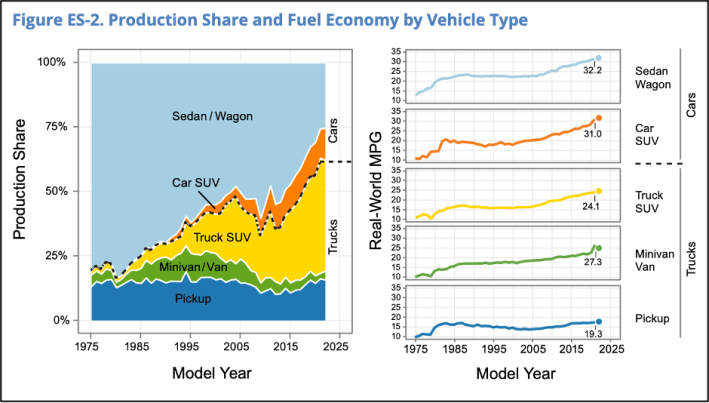
Average fuel economy on new U.S. vehicles hit a troubling plateau last year — and the reason why is particularly bad news for vulnerable road users, in addition to the planet at large.
According to the Environmental Protection Agency's annual Automotive Trends report, the average real-world fuel economy for model year 2021 vehicles remained at 25.4 miles per gallon, which is the exact same number the agency reported for model year 2020. Grams of CO2 emissions per mile remained essentially flat, too, falling about a half a percent over the same period.
The EPA put a sunny spin on the news, pointing out that the last two years' emissions rates are the lowest ever measured, even if progress appears to have stalled. The agency also noted, though, that average vehicle weight, footprint and horsepower have also hit record highs — and that "market shifts away from cars and towards sport utility vehicles (SUVs) and pick-ups have offset some of the fleetwide benefits."
In addition to undermining efforts to curb climate change, the federal vehicle class known as "light trucks" is widely regarded as a leading driver of U.S. pedestrian deaths, which surged 46 percent between 2010 and 2019 as SUV sales took off. Studies have shown that when SUV drivers, in particular, strike children, they are eight times more likely to kill them than motorists who choose sedans, hatchbacks, and other cars instead, in part because of those vehicle's aggressive front-end design.

Sustainable transportation advocates were also quick to point out that the emissions impact of megacars weren't simply the result of "market shifts," but the inevitable consequence of regulatory failures they've been calling out for decades.
Under the infamous "light truck loophole," automakers are subject to more lax fleetwide emissions standards if the portfolio of vehicles they sell includes a large percentage of the largest and deadliest cars on the road. The carveout, which was originally intended as a concession to the tiny slice of American workers who actually need heavy-duty vehicles to do their jobs, instead enabled automakers to sell passenger mega-cars to Americans unlikely to ever haul much more than a load of groceries — all without running afoul of environmental standards during an era of accelerating climate change.
And because it doesn't really cost all that much more to build a big car than a small one — one study estimated that the profit margins on SUVs are 40 to 51 percent higher than hatchbacks and sedans, mostly thanks to hefty mark-ups on luxury vehicle features — car manufacturers have a powerful incentive to dive into the light truck loophole headfirst. And their customers, in turn, have a powerful incentive to pay a premium for heavier and heavier "light" trucks, particularly as all their neighbors buy megacars that are more likely to kill the occupants of smaller vehicles in a crash.
The new EPA report noted some automakers are pursuing the SUV market so aggressively that they have actually increased their per-mile pollution between 2016 and 2021, forcing those companies to purchase emissions credits from greener ones or rely on credits that they'd banked in the past. Mazda reported the largest increase, thanks to the company's decision to roughly double the percentage of SUVs in its fleet over the past five years, though it still landed them slightly below the industry average; automakers GM and Stellantis, meanwhile, increased their already-chart-topping emissions levels even more.
According to the EPA's new report, fuel economy across the US car industry did not improve over the last 5 years. Want to guess why?
— David Zipper (@DavidZipper) December 13, 2022
If you said "too many SUVs," give yourself a prize. But definitely don't give car companies one.https://t.co/Bk3Higmzqv
Rather than waiting on unlikely "market shifts" to clean up a dirty transportation sector or de-escalate the SUV arms race on American roads, perhaps regulators should recognize how deeply interrelated the traffic violence and climate crises are — and finally take real action to end them.






